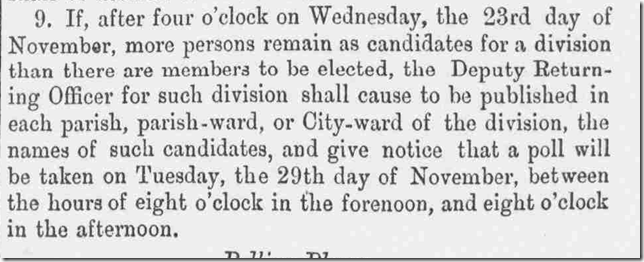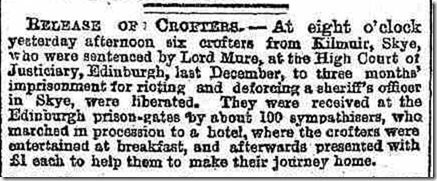There are two instances that come to mind where some have voiced concerns over the statements of witnesses when they have used the term 'afternoon', where we think 'evening' is to be expected. This assumption has raised questions about the reliability of the statements attributed to these witnesses.
In the first example we have the words of Constable Robinson when he arrested Eddowes for being drunk.
City-constable Lewis Robinson, 931, deposed: At half-past eight, on the night of Saturday, Sept. 29, while on duty in High-street, Aldgate, I saw a crowd of persons outside No. 29, surrounding a woman whom I have since recognised as the deceased........With the aid of a fellow-constable I took her to Bishopsgate Police-station.
To which the witness John Kelly told the court:
I heard she had been locked up at Bishopsgate-street on Saturday afternoon. An old woman who works in then lane told me she saw her in the hands of the police.
Questions have been raised about John Kelly's claim, that he was either mistaken, or lying, as "half-past eight" is not the "afternoon", it is the evening.
Likewise, Bowyer, on being asked by the Coroner when he last saw Mary Kelly alive, he replied:
"On Wednesday afternoon, in the court, when I spoke to her."
Yet, Bowyer is quoted in the press that he saw Mary Wednesday night:
"Harry Bowyer states that on Wednesday night he saw a man speaking to Kelly who resembled the description given by the fruiterer of the supposed Berner Street murderer."
Western Mail, 12 Nov. 1888.
Once again the issue has cause concerns that Bowyer was either mistaken, or lying, as "afternoon" and "night" (evening?), are clearly different times of day.
What has apparently gone unnoticed is that in 19th century terminology, "afternoon" and "evening" were interchangeable terms.
Examples of the use of "afternoon", where today we would expect to read "evening", or "night", are readily available in the newspapers all through the 19th century.
Here we read, "eight o'clock in the afternoon".

And again, "half-past eight o'clock on the afternoon".

And again, "at eight o'clock yesterday afternoon".

Timetables for High Water at London Bridge advise, "Afternoon, 16 min past 8" or "31 min past 9.".

There are literally hundreds of examples available, those I selected range from the 1840's through to the 1890's.
There is no cause to doubt the words of these witnesses. The failing, if any, is our understanding of terminology which has gone out of fashion.
In the first example we have the words of Constable Robinson when he arrested Eddowes for being drunk.
City-constable Lewis Robinson, 931, deposed: At half-past eight, on the night of Saturday, Sept. 29, while on duty in High-street, Aldgate, I saw a crowd of persons outside No. 29, surrounding a woman whom I have since recognised as the deceased........With the aid of a fellow-constable I took her to Bishopsgate Police-station.
To which the witness John Kelly told the court:
I heard she had been locked up at Bishopsgate-street on Saturday afternoon. An old woman who works in then lane told me she saw her in the hands of the police.
Questions have been raised about John Kelly's claim, that he was either mistaken, or lying, as "half-past eight" is not the "afternoon", it is the evening.
Likewise, Bowyer, on being asked by the Coroner when he last saw Mary Kelly alive, he replied:
"On Wednesday afternoon, in the court, when I spoke to her."
Yet, Bowyer is quoted in the press that he saw Mary Wednesday night:
"Harry Bowyer states that on Wednesday night he saw a man speaking to Kelly who resembled the description given by the fruiterer of the supposed Berner Street murderer."
Western Mail, 12 Nov. 1888.
Once again the issue has cause concerns that Bowyer was either mistaken, or lying, as "afternoon" and "night" (evening?), are clearly different times of day.
What has apparently gone unnoticed is that in 19th century terminology, "afternoon" and "evening" were interchangeable terms.
Examples of the use of "afternoon", where today we would expect to read "evening", or "night", are readily available in the newspapers all through the 19th century.
Here we read, "eight o'clock in the afternoon".

And again, "half-past eight o'clock on the afternoon".

And again, "at eight o'clock yesterday afternoon".

Timetables for High Water at London Bridge advise, "Afternoon, 16 min past 8" or "31 min past 9.".

There are literally hundreds of examples available, those I selected range from the 1840's through to the 1890's.
There is no cause to doubt the words of these witnesses. The failing, if any, is our understanding of terminology which has gone out of fashion.



Comment